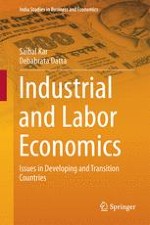
2015 | OriginalPaper | Chapter
1. The Dimensions of Labor Market in Developing and Transition Countries
Authors : Saibal Kar, Debabrata Datta
Published in: Industrial and Labor Economics
Publisher: Springer India
Activate our intelligent search to find suitable subject content or patents.
Select sections of text to find matching patents with Artificial Intelligence. powered by
Select sections of text to find additional relevant content using AI-assisted search. powered by